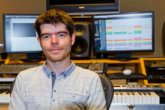Sony Computer Entertainment sound designer James Magee explains what’s involved in creating sound for video games.

Name?
James Magee
Place of work?
Freelance, currently under contract with Sony Computer Entertainment – London Studio.
Job?
Game Sound Designer
How long have you had the job?
I’ve been working in the game industry since late 2009 and have been in my current role at Sony since November 2012.
What does a typical day involve?
I get into work for 9.30am, have a cup of tea and attend quick ‘stand-up’ meetings with other members of the game team about the area of the project we are currently working on. Game development on any scale requires a mix of creative talents from various disciplines (art, animation, audio, code, production) and cross-team communication is very important when so many people are working together.
Next up, I’ll start work on whichever audio design or implementation tasks are currently scheduled to be done by the production team. The work is incredibly varied and could be anything from creating character Foley for in-game animation, gameplay sound effects such as weapon sounds, through to creating 5.1 ambiences that reflect level design or evoke a particular mood in the game.
The technical implementation of sound is a large part of my day to day work. Unlike linear media, the soundscape of a game world is often interactive in many of its elements (gameplay sound effects, music, and ambience). Interactive audio is incredibly useful in creating immersive and engaging experiences for the player, but it brings unique challenges.
There is only so much memory within a games console, PC or mobile device so limited audio budgets mean being selective and innovative in the way sound is implemented. Thinking about implementation helps shape the way in which I approach sound design, whether it be randomised one-shot sounds or a series of looping layers, and deciding how it will play back during gameplay really helps the creative process.
Interactive audio is incredibly useful in creating immersive and engaging experiences for the player, but it brings unique challenges.
Highs of the job?
The biggest high of the job is working in a creative role doing something I love. It stays interesting and challenging because of the large amount of variation from project to project, both creatively and technically.
The job also allows for creative freedom; you make your own creative decisions on which you get feedback and advice upon from the Audio Lead which creates a good working environment. It’s up to you to use your creativity and knowledge to complete the work to a standard you take pride in.
Studio culture is another part of game development I enjoy, working in a team of talented people who are at the cutting edge of their fields.
Lows of the job?
Game development often involves ‘crunch’ periods towards the end of a project cycle as deadlines loom, meaning some late nights and weekends to get a project finished and polished. It can leave you feeling burnt out at times, but it doesn’t happen too often and is far outweighed by the fun of working in games.
Who are the people who’ve had the biggest influence on your career and why?
During my time spent at De Montfort University studying music technology I took a couple of sound design modules taught by a brilliant lecturer, Dr Simon Atkinson. He really opened my mind to the ability of audio in film and games to produce an emotional response from the audience and my interest in sound design grew from there.
I started critically listening to the soundscapes of films being inspired by the work of great sound designers such as Skip Lievsay, Ben Burtt, Gary Rydstrom, Walter Murch and Randy Thom. Sound design and music from video games that have have influenced me include the Thief series in which interactive audio plays a large and immersive role, Doom 3 and incredibly polished titles like the Burnout series and Battlefield series.
I have also been very fortunate to have been mentored by and worked alongside talented audio professionals Garry Taylor (SCEE Audio Director), Joanna Orland (SCEE Senior Sound Designer) and Steven Grimley-Taylor (Audio Lead). These people have taught me a lot on how to improve my skills and ear as a sound designer, along with how to mix games and to identify what matters most within the soundtrack of a game world.
How did you get the job?
Audio departments within games companies are normally small in comparison to other disciplines and jobs are hard to come by, especially at a junior entry level. It took a lot of hard work to get into the industry but I am a firm believer in creating the opportunity if you want it enough!
After completing my music tech degree I worked as an assistant studio engineer recording music and dialogue at a local studio which helped me improve my practical skills. I also bought my own entry-level recording equipment and started getting involved in creating sound design for student films and animation. I wrote to everyone I could find in the game audio business and received great advice, including pursuing further study that might give me an edge. In 2007 I studied an MA in sound design at Bournemouth University, a well respected course amongst game and film audio professionals. After graduating it was still a struggle and a further 18 months of perseverance followed. Amid working temp jobs I kept up the networking and picked up work on small indie game projects. The break came in January 2010 which saw me land my first gig in the industry at Sony London Studio.
How can we get your job?
Game audio is an exciting and challenging job requiring both creative and technical skills. To get into the industry an applicant would need good creative ability in sound design and a strong understanding of how interactive sound works in a non-linear medium. Be passionate about games and get involved in any way you can to put a stunning showreel together. Network with everyone you can find, contact games companies, find and attend industry events and, if you stick at it, your break will come.

10.22 PM
Thief. Brilliant. Being a game sound designer has been a dream job ever since I played Thief 1 and 2. This guy has the best job.
06.04 PM
this is amazing, a total dream job that I hope it comes true.
http://monolenamusic.com/
10.13 AM
Im more interested in sound for film, I have completted a HE Certificate in Audio & Video Production and I am now studying as a 2nd year doing a BA(Hons) TV & Film Design
08.51 PM
Love this article
I finished my Ba in Music Tech in 2012, and started a PGCE teaching course this September.
Always been my plan to teach part time while searching for a game sound design job.
This article has really inspired me though to make it happen for myself, and possibly study a MA in Sound design